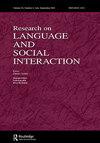过度曝光自我纠正:管理能力与道德的实践
IF 2.1
1区 文学
Q1 COMMUNICATION
引用次数: 4
摘要
在修复演讲中的问题时,演讲者有时不仅仅是简单地纠正错误,还会扩展自我纠正部分,对错误进行评论、重复、道歉和/或拒绝。我们称之为“过度曝光自我校正”。在过度暴露错误时,说话者可能会管理(并反射性地构建)它所引起的一系列归因问题。我们将讨论如何使用过度曝光的自我纠正:(a)纠正可能表明说话者无能的错误;(b)纠正可能被认为揭示关系“弊端”(暗示缺乏对他人的关注)或社会“弊端”(传达有问题的社会态度和偏见)的错误。因此,本文展示了关于修复的对话分析工作如何为研究互动中社会和关系问题的出现和管理提供一个平台。这些数据来自于美国、英国和澳大利亚英语中不同的会话互动语料库。本文章由计算机程序翻译,如有差异,请以英文原文为准。
Over-Exposed Self-Correction: Practices for Managing Competence and Morality
ABSTRACT When repairing a problem in their talk, speakers sometimes do more than simply correct an error, extending the self-correction segment to comment on, repeat, apologize, and/or reject the error. We call this “over-exposed self-correction.” In over-exposing the error, speakers may manage (and reflexively construct) a range of attributional troubles that it has raised. We discuss how over-exposed self-correction can be used to: (a) remediate errors that might suggest the speaker’s incompetence; and (b) redress errors that may be heard as revealing relational “evils” (implicating inadequate other-attentiveness) or societal “evils” (conveying problematic social attitudes and prejudices). The article thus shows how conversation analytic work on repair can provide a platform for studying the emergence and management of socially and relationally charged issues in interaction. The data come from a diverse corpus of talk-in-interaction in American, British, and Australian English.
求助全文
通过发布文献求助,成功后即可免费获取论文全文。
去求助
来源期刊
CiteScore
7.30
自引率
7.40%
发文量
20
期刊介绍:
The journal publishes the highest quality empirical and theoretical research bearing on language as it is used in interaction. Researchers in communication, discourse analysis, conversation analysis, linguistic anthropology and ethnography are likely to be the most active contributors, but we welcome submission of articles from the broad range of interaction researchers. Published papers will normally involve the close analysis of naturally-occurring interaction. The journal is also open to theoretical essays, and to quantitative studies where these are tied closely to the results of naturalistic observation.

 求助内容:
求助内容: 应助结果提醒方式:
应助结果提醒方式:


